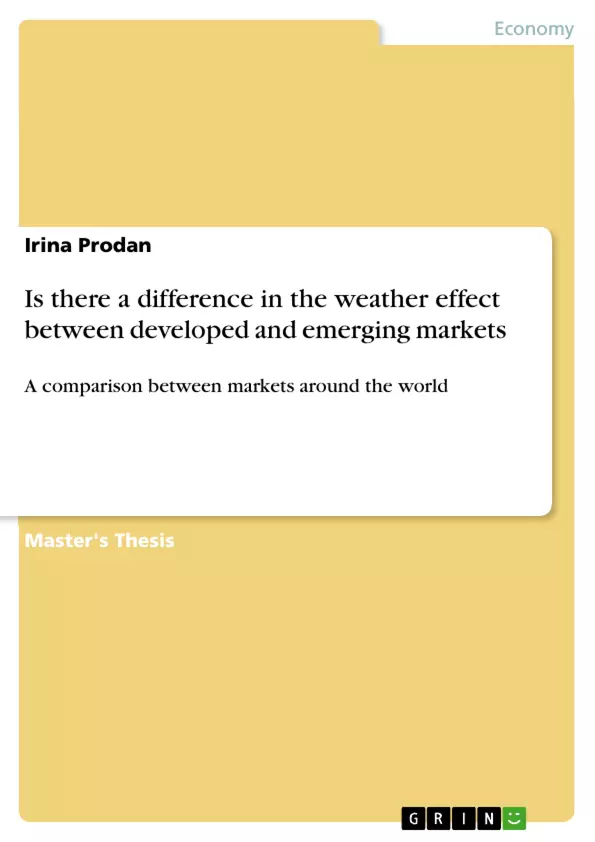One renowned and frequently researched anomaly over the last two decades is the weather effect – the impact of weather on stock market returns. The extensive literature on the weather effect fails to converge towards a unique, systematic and robust relationship between the weather and the stock market. Therefore, the aim of this paper is to explain the contradictory results in the literature by testing whether stock prices are affected by the weather in a significantly different manner depending on the level of market development and explaining how this difference behaves over time. In order to test for this, city-by-city, pooled and binary regressions are employed using data of 10 developed and 10 emerging countries over the period 1996-2011 by using two different means of seasonal adjustment. The results show that weather has a very small impact on the worldwide stock market returns and that the significance of the weather effect is decreasing over time with a cyclical pattern in terms of its recurrence. We identify the year 2001 as the cut-off point when the significance of weather on stock markets diminishes. No support has been found for a real difference in the weather effect between emerging and developed countries. However, evidence has been found of the relative inefficiency of the emerging markets and for the declining influence of weather in time.
Inhaltsverzeichnis (Table of Contents)
- Introduction
- Literature review
- Weather, mood and decision making behavior.
- Weather and the stock market.
- Two decades of weather effect literature: a lack of consensus
- Data description
- Data collection.
- Data analysis.
- Methodology and results
- City-by-city tests
- Joint tests
- Pooled least squares regression
- Binary regression.
- Robustness check
- City-by-city tests
- Joint tests.
- Pooled least squares regression.
- Binary regression.
- Potential explanations.
- Conclusion.
Zielsetzung und Themenschwerpunkte (Objectives and Key Themes)
This paper investigates the weather effect – the impact of weather on stock market returns – across developed and emerging markets, aiming to explain contradictory findings in previous research. It examines whether the relationship between weather and stock prices differs significantly based on the level of market development. Key themes explored in the study include: * **The Weather Effect and Market Efficiency:** Investigating whether the weather effect is more pronounced in emerging markets, potentially reflecting their lower levels of efficiency. * **Impact of Weather on Stock Returns:** Analyzing the significance of the weather effect on stock market returns globally and exploring potential differences between developed and emerging countries. * **Cyclical Pattern of the Weather Effect:** Identifying any cyclical patterns in the significance of the weather effect over time and examining potential breakpoints in the observed trends. * **Comparative Analysis of Developed and Emerging Markets:** Comparing the impact of weather on stock markets in both developed and emerging countries to determine if there are any significant differences. * **Behavioral Finance Considerations:** Exploring how behavioral finance theories, particularly the role of investor psychology, can help explain the observed relationship between weather and stock market activity.Zusammenfassung der Kapitel (Chapter Summaries)
- **Introduction:** The paper introduces the weather effect, a widely studied market anomaly, and outlines the objective to determine if its impact varies significantly between developed and emerging markets. The paper argues that emerging markets may be more susceptible to the weather effect due to their potentially lower efficiency and greater reliance on local investors.
- **Literature Review:** The review discusses existing research on the relationship between weather, mood, and decision-making behavior, as well as previous studies on the weather effect in financial markets. It highlights the conflicting findings in the literature and the need for further investigation.
- **Data Description:** This chapter details the data sources used in the study, including the collection process and the specific variables analyzed. It provides information on the geographic scope of the data and the time period covered.
- **Methodology and Results:** The paper outlines the methodology used to test for a difference in the weather effect between developed and emerging markets. It presents the results of city-by-city tests, pooled least squares regression, and binary regression analyses.
- **Robustness Check:** This section explores the robustness of the findings to different methods of seasonal adjustment. It tests the results using alternative approaches to ensure the conclusions are not significantly influenced by the chosen adjustment method.
- **Potential Explanations:** The study proposes several potential explanations for the observed results, considering factors such as market efficiency, investor behavior, and the influence of local versus foreign investors.
Schlüsselwörter (Keywords)
The main keywords and focus topics of this paper include: behavioral finance, weather effect, stock market returns, developed and emerging countries. This research focuses on exploring the influence of weather on stock market returns in different levels of market development, providing insight into the relationship between investor psychology, market efficiency, and the impact of weather on financial markets.Frequently Asked Questions
What is the "weather effect" in finance?
The weather effect refers to the observed impact of weather conditions (like sunshine or rain) on investor mood and, consequently, on stock market returns.
Is there a difference between developed and emerging markets?
The study found no significant real difference in the weather effect between emerging and developed countries, although emerging markets show relative inefficiency.
How does the weather effect change over time?
The significance of the weather effect appears to be decreasing over time. The study identifies 2001 as a cut-off point where its influence diminished.
Why do emerging markets show more inefficiency?
Lower market efficiency in emerging countries often stems from less transparency, fewer institutional investors, and a higher reliance on local retail investors.
What methodology was used in this research?
The paper uses city-by-city, pooled, and binary regressions analyzing data from 10 developed and 10 emerging countries between 1996 and 2011.
- Quote paper
- Irina Prodan (Author), 2012, Is there a difference in the weather effect between developed and emerging markets, Munich, GRIN Verlag, https://www.grin.com/document/200409



